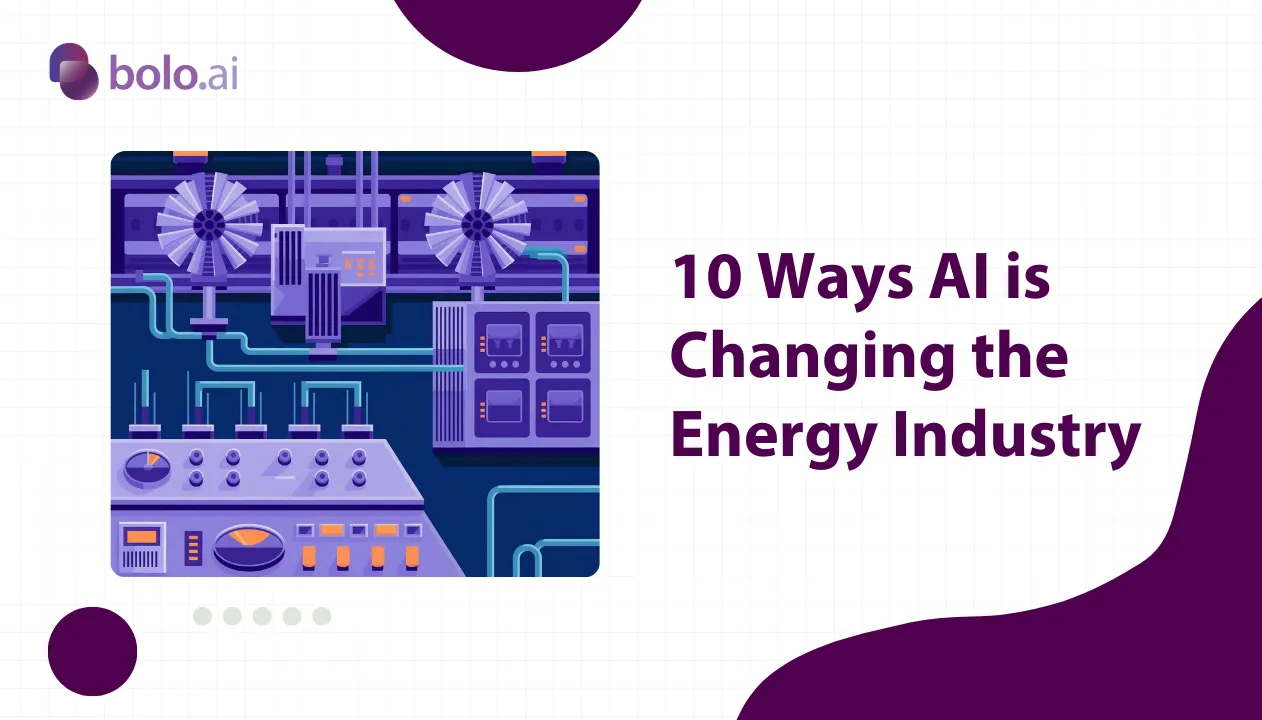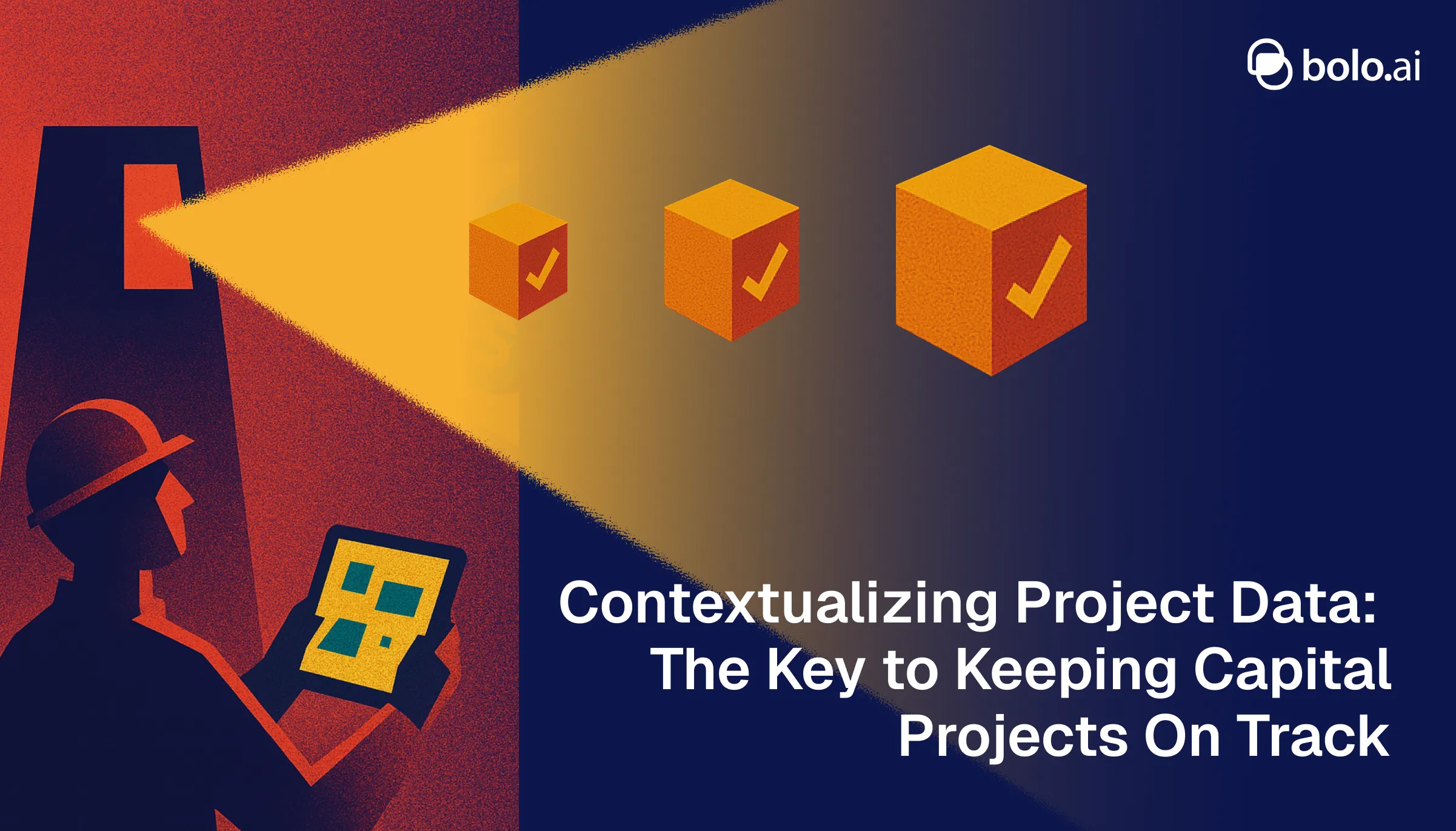The energy industry is standing at the crossroads of innovation and necessity. With an anticipated CAGR of 17.2% from 2024 to 2030 (Grand View Research), utilizing artificial intelligence in the energy industry is no longer a futuristic concept. It’s the transformative force reshaping every corner of the sector, from production and trading to sustainability and safety.
But what does this transformation look like on the ground? For energy companies, it’s about addressing some of their biggest challenges: operational inefficiencies, compliance complexities, and the relentless demand for sustainable practices. This is where AI steps in, unlocking possibilities that were previously out of reach.
At Bolo AI, we’re not just observers of this transformation; we’re enabling it. In this post, we'll explore 10 key ways AI is changing the energy landscape, highlighting real-world use cases and showcasing how innovative companies like Bolo AI are empowering energy businesses to unlock the full potential of their operational knowledge.

1. Predictive Maintenance: Avoid Downtime, Save Millions
In the energy industry, downtime doesn’t just disrupt operations—it costs millions. From halted production lines to costly emergency repairs, unexpected equipment failures are a burden no company can afford. Predictive maintenance, powered by AI, is rewriting the rules by transforming the way the energy sector manages machinery and operations.
How Predictive Maintenance Works
AI leverages sensor data from equipment to analyze performance patterns and detect early signs of wear and tear. Instead of waiting for something to break down, companies can act proactively, scheduling maintenance precisely when it’s needed. This eliminates unnecessary maintenance, reduces downtime, and ensures equipment runs at peak efficiency.
Why It Matters
The shift from reactive to predictive maintenance is a game-changer. According to Accenture, predictive maintenance can reduce downtime and maintenance costs by up to 40%. With AI monitoring every critical component, companies no longer have to play catch-up. They can focus on operational excellence and cost savings in the order of millions of dollars.
Real-World Example:
Compressors are pivotal in petrochemical operations, maintaining the pressure required for critical reactions. Their high-speed rotations and exposure to varying loads make them vulnerable to wear. AI systems analyze vibration patterns and temperature fluctuations, predicting bearing failures or seal leaks before they disrupt operations. Proactive maintenance ensures reliability and reduces downtime.
Key Takeaways:
- Predictive maintenance minimizes unplanned downtime and reduces repair costs.
- Companies gain operational confidence, knowing that their equipment is monitored continuously by intelligent systems.
The result is a more reliable, efficient, and cost-effective energy operation.
.png)
2. Real-Time Data Access for Decision-Making: Knowledge at Your Fingertips
In the fast-paced energy industry, having access to accurate, real-time data is essential for making informed decisions. Yet, for many companies, operational knowledge is scattered across systems, making it difficult to retrieve critical information when it’s needed most. AI changes this by centralizing knowledge and providing instant, source-linked answers.
How AI Improves Data Access
AI-powered platforms like Bolo AI act as intelligent assistants, organizing and retrieving operational data effortlessly:
- Centralized Knowledge: AI integrates data from multiple sources, such as safety manuals, equipment specifications, and regulatory documents.
- Instant Answers: Users can ask natural language questions (e.g., "What are the safety protocols for Pipeline A?") and get precise, source-linked responses.
- Efficiency Boost: Teams spend less time searching for data and more time acting on it.
Example: Bolo AI in Action
Imagine a refinery manager needing safety protocol details during an inspection. Instead of sifting through dozens of files, they can query Bolo AI for the information and receive an instant, accurate answer. This streamlined access improves efficiency and ensures decisions are based on reliable data.
Key Benefits
- Faster decision-making through real-time access to critical data.
- Improved operational efficiency by reducing time spent on manual searches.
- Enhanced collaboration as teams access and share centralized knowledge seamlessly.
With AI, decision-making becomes smarter, faster, and more informed.
3. Lease Document Review and Compliance: Simplifying Complexity
In the energy industry, particularly in North America, lease agreements play a pivotal role in ensuring a legal framework to run smooth exploration, development, and production operations. However, managing thousands of complex lease documents across multiple jurisdictions is often a daunting task, rife with opportunities for errors and inefficiencies. AI is revolutionizing this process, turning an overwhelming challenge into a streamlined, precise workflow.
Challenges in Lease Management
Energy companies often struggle with:
- Volume: Managing tens of thousands of documents across regions.
- Complexity: Interpreting intricate lease terms, royalty calculations, and regulatory requirements.
- Risk: Errors in compliance or royalty payments can lead to legal disputes and financial penalties.
AI to the Rescue
A leading carbon-neutral oil and gas producer faced significant challenges managing 40,000+ lease agreements. The traditional approach—manual reviews—was slow, error-prone, and expensive.Bolo AI Answers: Land Module, is transforming their lease management process:
- Document Analysis: Bolo AI ingested and analyzed thousands of lease documents, extracting critical information like payment terms and compliance clauses.
- Precision: Automated reviews ensured accurate royalty calculations, minimizing costly errors.
- Efficiency: The time and effort required for reviews dropped significantly, enabling faster decision-making.
Results That Matter
- Faster, more informed decision-making.
- Reduced compliance risks and regulatory penalties.
- Substantial cost savings through increased operational efficiency.
Why AI Is Essential for Lease Management:
AI doesn’t just accelerate the review process, it provides clarity and confidence. From ensuring compliance to calculating royalties accurately, AI allows energy companies to focus on strategic initiatives instead of drowning in administrative tasks.
.png)
4. Workforce Training and Knowledge Retention in Oil and Gas with AI
Training and onboarding employees in the oil and gas industry is no small feat. From mastering operational protocols to retaining critical knowledge for day-to-day operations, the process is often time-intensive and resource-heavy. This challenge is further compounded by high turnover rates and the need to upskill employees on complex workflows and safety standards.
Bolo AI Answers transforms how training and knowledge retention are managed in oil and gas operations, offering a smarter and more efficient solution.
How AI Enhances Workforce Training and Knowledge Retention
- Centralized Knowledge Repository:
Bolo AI consolidates training materials, safety manuals, and operational guides into a single, easily accessible platform. Employees no longer need to sift through scattered documents; they can simply query the system for precise, source-linked answers. - On-Demand Learning:
With Bolo AI Answers, employees can access tailored training content when and where they need it. For example, a new hire can ask, "What’s the startup protocol for Rig X?" and receive detailed, step-by-step instructions instantly. - Role-Specific Insights:
AI customizes content delivery based on the employee’s role, ensuring relevance and reducing information overload.
Example: Bolo AI in Action
Imagine a field technician onboarding to maintain pipeline integrity. Instead of relying solely on extensive training sessions, they can use Bolo AI to retrieve protocols, troubleshooting steps, and maintenance histories instantly. This accelerates their learning curve while reducing the burden on senior staff.
Key Benefits
- Faster onboarding with instant access to operational knowledge.
- Improved knowledge retention through on-demand, role-specific learning.
- Reduced reliance on subject matter experts for repetitive questions.
With Bolo AI, workforce training evolves into a smarter, more efficient process that empowers employees and boosts operational excellence.
5. AI in Upstream Oil and Gas Operations
The upstream sector is the lifeline of the oil and gas industry, encompassing exploration, reservoir management, and production processes. However, these activities are fraught with challenges, from locating new reserves to optimizing resource recovery. AI is transforming upstream operations, enabling companies to achieve greater efficiency and precision.
How AI Optimizes Upstream Operations
- Exploration Made Smarter:
AI analyzes geological and seismic data to pinpoint potential reserves with higher accuracy. This reduces the need for exploratory drilling, saving time, resources, and environmental impact. - Enhanced Reservoir Modeling:
AI-driven algorithms process vast datasets to create dynamic reservoir models. These models help predict fluid behavior, optimize well placement, and enhance recovery rates. - Production Optimization:
AI monitors real-time production data, identifying bottlenecks and recommending adjustments to maximize output.
Example: AI-Driven Exploration Success
An oil and gas company used AI to analyze seismic data across multiple regions. The system identified potential drilling sites with an accuracy rate 25% higher than traditional methods, leading to quicker decision-making and reduced exploration costs.
Key Benefits
- Faster and more accurate identification of new reserves.
- Increased recovery rates through optimized reservoir management.
- Reduced costs and environmental impact from unnecessary drilling.
By integrating AI into upstream operations, oil and gas companies can unlock untapped potential, streamline processes, and stay ahead in a competitive industry.
6. AI for Risk Management in the Energy Industry
Risk management in the oil and gas sector is critical to avoiding financial losses, ensuring operational safety, and maintaining regulatory compliance. Traditional methods of risk detection often struggle to keep up with the complexity and scale of operations. AI offers a proactive solution, detecting anomalies and mitigating risks before they escalate.
How AI Enhances Risk Management
- Anomaly Detection in Transactions:
AI monitors financial transactions in real time, flagging irregularities such as duplicate payments or unauthorized approvals. - Contract Compliance Analysis:
AI reviews contracts to identify potential risks, such as missing clauses or non-compliance with regulatory standards. - Operational Risk Reduction:
AI continuously monitors equipment performance and environmental conditions, predicting potential failures or hazards before they occur.
Key Benefits
- Financial protection through real-time fraud detection.
- Enhanced contract compliance, minimizing legal risks.
- Reduced downtime and accidents with predictive risk management.
AI transforms risk management from a reactive process into a proactive strategy, ensuring safer, more secure operations across the oil and gas value chain.
7. Carbon Capture and Storage Optimization: Paving the Way for Cleaner Energy
As industries strive to reduce carbon footprints, Carbon Capture, Utilization, and Storage (CCUS) projects are becoming essential. These projects involve identifying and preparing sites where captured carbon can be securely stored, a process that demands precision and careful analysis. This is where AI plays a pivotal role, making carbon storage not just feasible but more effective.
How AI Optimizes CCUS Projects
AI leverages vast datasets, including geological surveys, site history, and fault analyses, to identify the most suitable storage locations. Instead of relying solely on traditional methods, which can be time-consuming and prone to error, AI streamlines site selection with:
- Geological Suitability Analysis: AI evaluates rock formations for stability and containment potential.
- Risk Assessment: It predicts fault risks and ensures the site meets long-term safety standards.
- Efficiency Gains: AI accelerates site evaluations, enabling faster deployment of CCUS initiatives.
Real-World Applications:
In CCUS projects, AI enables energy companies to select storage sites with greater accuracy and speed. For example, using AI, companies can quickly identify and approve locations for large-scale carbon storage, ensuring compliance with safety standards and environmental goals.
Key Benefits
- Faster site selection saves time and reduces project costs.
- Improved accuracy minimizes risks of leaks or storage failures.
- Enhanced safety ensures regulatory compliance and public trust.
With AI’s support, CCUS projects are transforming from theoretical solutions into actionable strategies for a cleaner future.
9. Safety Compliance and Risk Reduction: Protecting People and Operations
Safety is non-negotiable in the energy sector. From refinery operations to on-site maintenance, adherence to safety regulations is critical to preventing accidents and ensuring employee well-being across the energy value chain. However, manual compliance processes are often slow and leave room for human error. AI offers a transformative solution, automating safety checks and reducing risks.
How AI Ensures Safety Compliance
AI enhances safety compliance by:
- Automating Inspections: AI systems can monitor equipment conditions and flag potential issues before they escalate.
- Real-Time Reporting: Automated tools generate detailed compliance reports, ensuring adherence to safety standards.
- Risk Prediction: AI identifies patterns in past incidents, helping teams proactively address risks.
Example: Automated Safety in Refineries
In refineries, AI-powered systems continuously monitor equipment and processes to ensure compliance. For example, AI might detect anomalies in pressure levels and trigger immediate alerts, preventing accidents and maintaining operational safety.
Key Benefits
- Reduced risk of accidents through proactive monitoring and alerts.
- Faster compliance reporting minimizes downtime during audits.
- Safer workplaces protect employees and enhance organizational reputation.
AI doesn’t just improve compliance—it builds trust and safeguards lives.
10. Accelerating Energy Transition Goals: Building a Sustainable Future
The global shift toward renewable energy is more than a goal—it’s an imperative. For the energy sector, meeting this challenge means adopting technologies that make renewable integration seamless and effective. AI plays a crucial role in supporting energy transition goals by optimizing storage solutions and vehicle-to-grid (V2G) systems.
How AI Accelerates Energy Transition
AI improves the adoption and integration of renewable energy by:
- Enhancing Energy Storage: AI optimizes the scheduling and usage of battery storage, ensuring renewable energy is available when needed.
- Vehicle-to-Grid Systems: AI manages V2G networks, allowing electric vehicles to store and share energy, stabilizing the grid during peak demand.
- Maximizing Efficiency: AI balances energy supply and demand, reducing waste and ensuring a consistent flow of clean energy.
Example: Optimized Energy Storage
For instance, AI can predict when wind turbines will generate excess power and schedule that energy for storage. During periods of high demand, the stored energy is seamlessly dispatched to the grid, reducing reliance on fossil fuels.
Key Benefits
- Improved renewable energy integration reduces dependency on traditional power sources.
- Optimized energy usage lowers costs and enhances grid resilience.
- Accelerated progress toward sustainability targets supports ESG commitments.
With AI, energy companies can turn the promise of renewable energy into a reliable, everyday reality.
.png)
Conclusion
The energy sector is undergoing a seismic shift, with AI at the heart of its transformation. From optimizing operations and reducing downtime to integrating renewable energy and ensuring ESG compliance, artificial intelligence is revolutionizing how energy companies achieve efficiency, sustainability, and profitability.
Bolo AI Spark is here to accelerate this journey, delivering live operational AI intelligence in just 10 days.
Unlike traditional AI implementations that take months and drain resources, Spark offers actionable insights tailored to your business with minimal financial risk—just $1 to get started. Whether it’s analyzing critical documents, conducting real-time queries, or providing interactive workshops, Spark ensures that your energy operations are smarter, faster, and more impactful from day one.
Experience the future of energy operations with Bolo AI Spark. Unlock live AI intelligence tailored to your business needs—all for just $1.
Send us a mail at info@bolo.ai to get started!









